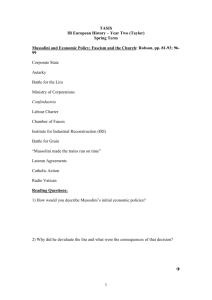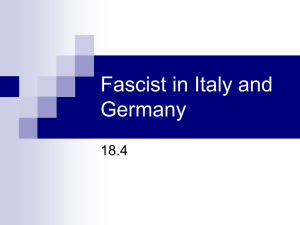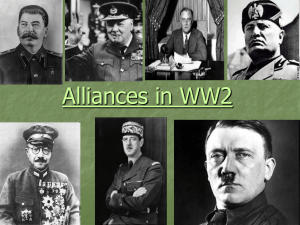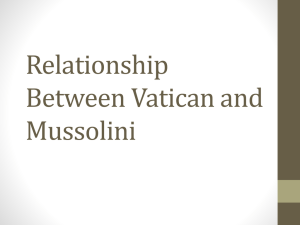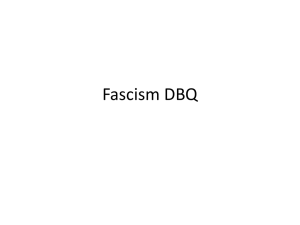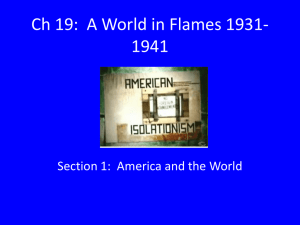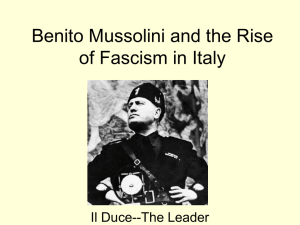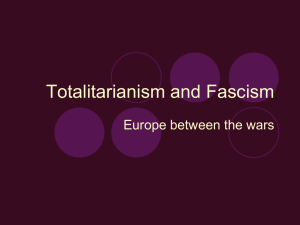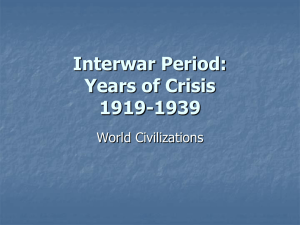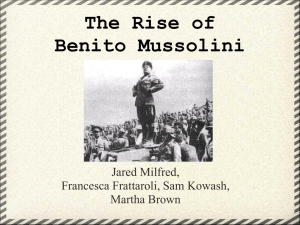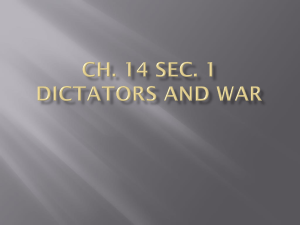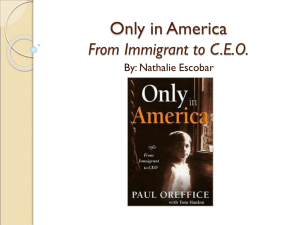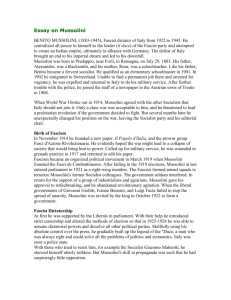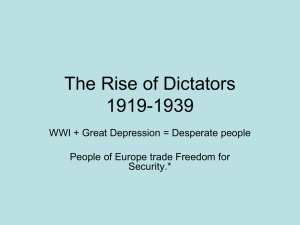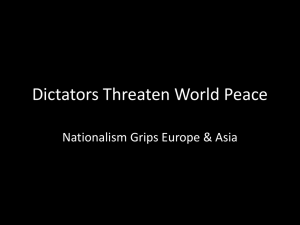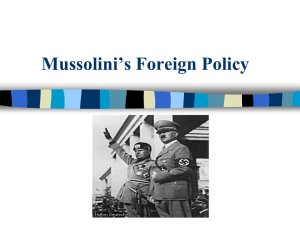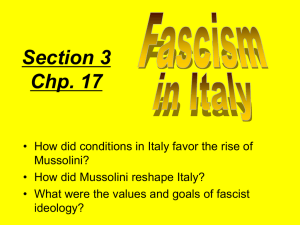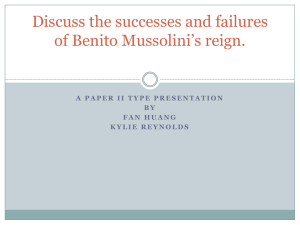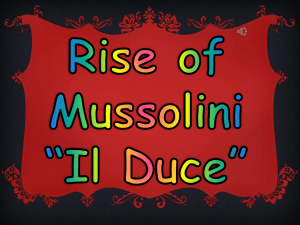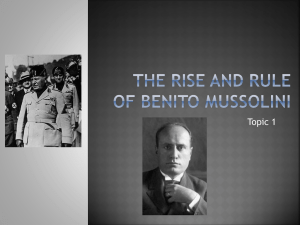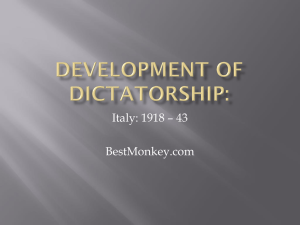File
advertisement
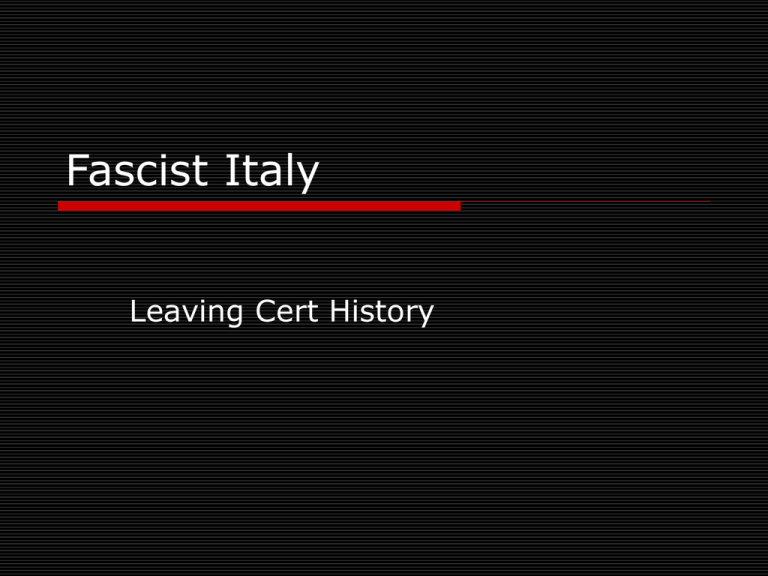
Fascist Italy Leaving Cert History Why many Italians were disappointed with democracy Rich north and poor south Few had a strong national identity (not long united) Tensions between church and state 600,000 dead soldiers in WW1 At the Paris Peace Conference, Orlando failed to get some lands they expected to get (North Tyrol, Dalmatia and Fiume). Nor did they get any German colonies. Italians very disappointed with their government. 2 million unemployed Strikes and lockouts Peasant unrest Mussolini’s Early Life Blacksmith’s son Socialist family Quit teaching and became editor of socialist newspaper Expelled from socialist movement for favouring WW1 Injured in grenade practice. New newspaper ‘Il Popolo d’Italia’ called for a dictatorship to solve the problems. Birth of Fascism 1919 Mussolini set up the first combat group ‘Fascio di Combattimento’ Fascio, Roman salute, blackshirts. Noisy marches against socialism and communism. Popular with unemployed. Characteristics of Fascism Ultra-nationalism Totalitarianism (strong government) Cult of the leader Racism Anti- communism (biggest single reason for popularity) Becoming popular Won no seats in 1919 as the Fascist Party had some extreme socialist views so Mussolini dropped these (opportunist). Wealthy capitalists gave money (Fiat, Pirelli and banks). ‘Squadristi’ were violent paramilitaries who intimidated opponents. 1922 socialists called a general strike to protest against the government. March on Rome Prime Minister Facta asked King Victor Emmanuel III to call out the army. Instead he asked Mussolini to become PM He had only 35 seats out of 535 The March on Rome became a victory parade. Becoming a Dictator With only 35 seats Mussolini made no dramatic changes. This reassured the other parties and they gave him a huge vote of confidence. The king allowed Mussolini to rule by decree for one year. The ‘Acerbo Law’ was passed which gave 2/3 of the seats to the biggest party In 1924 the Fascists became the biggest party Becoming a Dictator Fascist violence became endemic. Matteotti, a leading socialist strongly denounced Fascism. He was killed and the scandal made Mussolini’s position difficult. Socialists withdrew from parliament as a protest. Now there was no effective opposition 1926 parliament gave him the power to rule by decree Il Duce Superman V lazy, arrogant Propaganda OVRA secret police dealt with opponents but only 10 killed. Only 4000 sent to concentration camps. Only passed the Race Law under pressure from Hitler in 1938. This banned Jews from the army, government jobs and owning large businesses. Balilla (Fascist Youth) Church-State Relations Mussolini and the Church Mussolini an atheist before 1922. Much to gain by healing rift between Church and State. Brought in laws restricting contraception and abortion. Allowed religious displays in schools and public buildings. Financial rescue for the Catholic Bank of Rome. 1925 church wedding 10 years later and baptised children. The Lateran Treaty 1929 Vatican independence Catholicism made the state religion Church given control of religious education Pius XII recognised the Italian state Church no longer claimed state lands Mussolini at his most popular Pope saw him as a champion against Communism. 1938 church rejected Race Law During WW2 Church quietly criticised Fascist excesses The Economy De Stefani Minister for Finance 1922-25 Tax concessions to attract foreign industry Reduced government expenditure. Unemployment fell dramatically Autarky Mussolini wanted selfsufficiency. He believed that a large population and an empire were needed for this. Economic battles: Battle for Grain. Expensive bread and reduced production of other foods. Battle for land. Pontine marshes and others Battle for Lira. Sacked De Stefani and revalued lira in 1926. Made exports dearer and had to devalue in 1936 Battle for births. To provide soldiers. Tax incentives and medals. Failed. The Corporate State Mussolini believed that all sides should work for the common good. Lockouts and strikes and Trade Unions banned Every profession and industry had its own corporation with 3 fascist members. Corporations favoured the employers and wages fell by 10%. Standard of living one of the lowest in Europe. Better social insurance for workers. Other reforms Trains and autostrada More schools. Better standards of education. Indoctrination. Squadrisri drove many Mafia gangsters to USA The weakness of Italy’s economy was shown up when WW2 began Foreign Policy A New Rome Wanted to make the Mediterranean ‘an Italian lake’ Saw himself as an emperor. 1923 occupied Corfu until Greece paid compensation for 4 murdered Italians 1924 occupied Fiume Otherwise in the early years was accepted as a moderate by other European powers. Alliance with Hitler 1935 Italy formed the Stressa Front with Britain and France (to oppose German rearmament and expansion) as M was concerned that Hitler might invade Italy. 1935 took Abyssinia in spite of League of Nations’ sanctions. Also in 1935 League of Nations’ sanctions were put on Germany for Rhineland. This put Hitler and M in the same boat and in 1936 they signed the Rome-Berlin Axis. 1937 Japan joined in the Anti-Comintern Pact 1938 Italy not ready for war and M was peacemaker at Munich Conference. 1939 Pact of Steel a full military alliance. Spanish Civil War Joined Franco to show military might. Between Spain and Abyssinia, Italy was exhausted militarily and economically by 1939. World War 2 He did not join the war until June 1940 when Hitler looked certain to win. Italian army in Greece and North Africa were weak. By 1943 the Allies were in Sicily despite German help. Mussolini was also minister for War and was blamed. He was deposed and jailed. Marshal Badoglio surrendered to the Allies and declared war on Germany. German commandos freed Mussolini. He was made head of a puppet government (the Salo republic). As the Allies moved north Mussolini tried to flee Mussolini and Clara Petacci shot and displayed in Milan.
